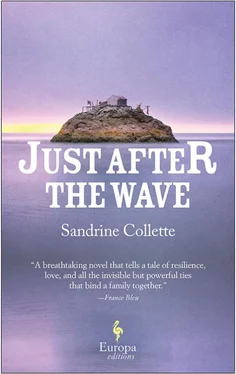It’s a winner.
Like Lucette.
Tomorrow they will smoke the fish, so they’ll keep for the length of the journey, and they’ll filter the water to fill the empty bottles. They’ll inventory the last potatoes, and the last cans in the larder, they’ll check for hiding places where the hens might have laid eggs. They’ll picture how to arrange the boat to hold the five of them, with cushions for the grannies’ old bones—this was their request. But for now they still need a few more fish, until Adele finally gets up and stops Noah and Louie as they’re about to cast their lines for the hundredth time. Very precisely, she puts her hands on their shoulders and says:
“I think we have enough, now. Time to get some sleep, to build up your strength.”
And everything stops.
Time doesn’t go by; that’s what they are thinking the next day, as they make endless preparations for the voyage. The water, more than anything, is slowing them down, taking so long to filter, but Adele won’t have it any other way, she wants to fill their thirty-four bottles and not a single one less. Under the baking sun Lucette explains to Louie and Noah how to rig poles in the boat on which to stretch a canvas. They are afraid it will blow away with the first gust of wind, like their tarp during the storm: never mind, says the old lady, it will last as long as it lasts. And besides, in September the spring tides are over, the storms less frequent. Even if the seasons have gone haywire.
The two boys exchange glances. Their memory is of storms coming one on top of the other.
Maybe they were the last of the season.
But maybe not.
Lucette hums a tune they don’t know, a song her grandmother used to sing, she explains, a long time ago. She and Adele have been up since dawn, cutting the fish and preparing the fillets: by the time the children woke, they had lit the fire and already extinguished it again so that only smoke remained. No flames or embers; and yet you had to keep it going underneath, otherwise it would all go out, and the fish would never get smoked. They showed Louie how to keep an eye on the hearth. The first fillets had been carefully arranged on a grill.
“It stinks,” said Noah, “it makes me feel sick.”
So he went to get the boat ready.
Perrine stayed with the old ladies.
Hours of waiting, clenching their fists to urge the fish to cure and the water to flow more quickly, and accept the fact that it wouldn’t help at all to blow on the fish or to stir the water to filter it—an entire day, a wasted day, according to the children; they chafe at the bit, they wish they were already on their way, to have it behind them, because in reality one day more or less makes no difference, but, when the children see how Adele and Lucette gaze at the houses—what’s left of them—and sigh, and lower their heads as they come back inside, walking slowly, they’re afraid one of them might get cold feet.
And they are right to be afraid.
Oh, until the end of the afternoon, nothing alarming.
And then.
When they’d finished filling the water bottles and placing the fish filets in plastic containers, separated by sheets of paper, when everything had been readied in the house for the next day, except for the hens, which they’ll have to catch at the last minute, belongings on one side, food on the other, and they were sitting on the sofa staring at the black television screen, counting the hours until departure, at seven in the morning, since before then it’s still dark out: that’s when the argument started.
Initially they didn’t hear it, or paid no attention, Adele and Lucette were in the bedroom, talking, on the other side of the thick walls.
But their voices were raised: that’s why the children started listening.
“Do you understand?” murmured Louie faintly to the other two.
Perrine and Noah shook their heads.
“What can they be saying?” said Noah, worried.
No time to share their questions any further: a door slams, Adele comes into the room, three pairs of eyes instantly riveted on her, Lucette follows right behind, waving her arms with such intensity that if her rheumatism weren’t restraining her those arms would enfold the entire living room.
“No, you won’t stay!”
“Yes, I will.”
“I won’t leave you here.”
“Of course not. Go ahead and try.”
“We won’t leave without you!”
“What?” exclaims Louie.
The old ladies freeze. As if seeing the children for the first time, as if they are about to frown and wonder who they are, that’s how far away they seem, but then something lights up in their gaze, they acknowledge them, and fall silent, embarrassed. So Lucette turns to the children:
“Adele doesn’t want to leave anymore.”
“Huh?” says Noah.
“Who?” says Perrine.
Adele purses her lips:
“I helped get everything ready for the trip, I’ve done my bit. But I’m staying here.”
“But why?” asks Louie, stunned. “The sea is rising, and you’ll die.”
“Never mind. I no longer have the strength.”
“We’re the ones who’ll be rowing!”
“… to live somewhere new. I’m afraid of leaving. I’m afraid of being all alone in a foreign place.”
“I’m here,” protests Lucette.
Adele spreads her arms in a gesture of resignation. A faint smile.
“It’s not enough.”
Louie looks at her. He doesn’t understand. Or only just an inkling, because there are three of them, Louie, Perrine, and Noah, until they find their entire world—which will mean all eleven of them, Pata and Madie and their six brothers and sisters who left before them on the sea. If they were alone, would they feel the same? Who is waiting for Adele? Maybe no one. If he had no one, thinks Louie, would he confront the sea?
Yes he would, dammit. Because of drowning. Feeling the sea rising until there’s nothing left under your feet on which to climb any higher. Having to resist, and keep on resisting until you have no more strength. And then giving in. To Louie there can be nothing more frightening—not even setting out for a second time on the gray, menacing water in a leaky old boat.
The thought of being drowned in her house: she must have realized, Adele, she can’t not care. The vain struggle against the water, against fear and asphyxiation. Has she ever experienced anything as awful as the waves submerging you, and the water filling your throat all the way to your guts, and the fear taking your breath away, paralyzing your arms and legs, when you’re just a dead weight hanging on your heart—that’s what happened to him when the man on the island toppled him into the water and tried to cling onto him, then went after him, and he only got away at the last moment, hanging onto the boat like a fish on a hook, he was, and he is sure that if Adele had ever experienced anything like that, she wouldn’t want to stay here, in this house that is about to be engulfed.
But he doesn’t say anything.
He just looks at her.
In fact, there is no solution.
No one has one.
And that is what is suddenly driving Lucette half-crazy, this helplessness, because none of them can convince Adele, none of them can oblige her—to be sure, if Lucette were strong enough, she’d grab hold of her and drag her onto the boat, they’d all leave the island together and speak of it no more, that is what Lucette is thinking, but she is only too well-acquainted with her flabby arms and aching back, how every morning she has to roll over to the edge of the bed to get up without it hurting too much.
And still: she shouts, Lucette, and weeps, too, she doesn’t want Adele to die, and she flings her hands about as if she were about to move, to let the sorrow out, to hit her, of course she won’t hit her, but she will vent all her anger and sadness and despair. Adele gets annoyed, Hush, stop it! Then Lucette takes her by the shoulders and shakes her.
Читать дальше












